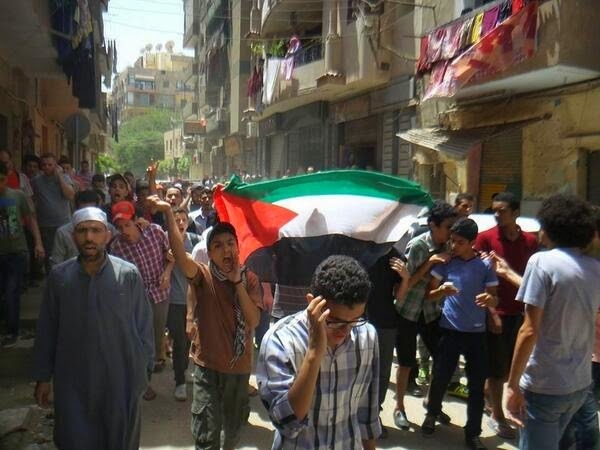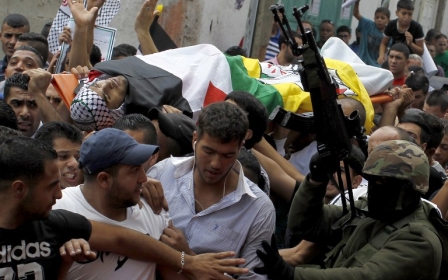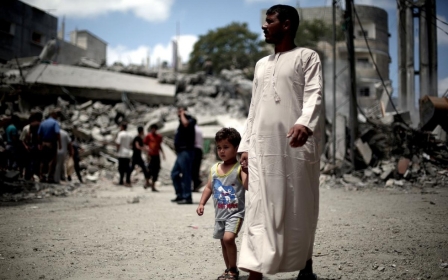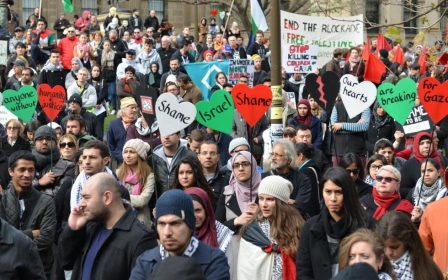Keeping Egypt's Gaza response in context

While I appreciate that the Egyptian regime is being exposed for what it is, I don't appreciate that the internal situation in Egypt is being taking in a correct context, nor that the pro-Palestinian Egyptian voice is not given enough credit or even a mention. I don't appreciate that what old white non-Arab non-Palestinian non-Muslim men residing in North America and Europe think of Palestine and Gaza is more relevant to the international community than what people like myself who reside a few hours away from Gaza and are directly being affected by the same authority oppressing the Palestinians think.
I'm a young woman who happened to be born and raised in Cairo whose politicisation began with the Palestinian cause in the early 2000s and late 1990s years before the cable TV and the internet.
I'm also an Egyptian who participated in the revolutionary movement opposing the US-funded Egyptian military regime in early 2011 and its domestic and foreign policies - most importantly the long lasting shameful Egyptian diplomatic position on Palestine and more specifically on Gaza.
There are hundreds of thousands if not millions of Egyptians like myself out there but for some reason their voices are being sidelined and their existence is being overlooked from the current conversation on the crisis in Gaza.
When it comes to Egypt, there is much out there already on:
1- How Egypt of the coup is complicit in the current crisis in Gaza.
2 - Egypt under Morsi vs. Egypt under Sisi, comparing the Egyptian diplomatic positions regarding Gaza in 2012 and the current one.
3 - Egypt the anti-Palestinian in diplomacy, in the media, and in the public arena.
4 - Why Egypt should open the Rafah crossing.
So, I won't talk about these items as much.
In this piece I will:
1 - Talk about the pro-Palestine revolutionary Egyptian body.
2 - Contextualise how the post-coup internal crisis in Egypt affected the pro-Palestine Egyptian population's expression of solidarity and opposition.
3 - Highlight the Sinai Peninsula and why it's been overlooked from the current conversation on Palestine.
4 - Point out to some of the issues I have with the mainstream pro-Palestine discourse regarding Egypt especially within the rights and advocacy camps.
The overlooked consequences of the military coup on the pro-Palestine Egyptian body:
I can assure from my personal experience that the year 2011 of the #Jan25 uprising and then the year 2012 have witnessed the most open populace expression of anti-Zionist and pro-Palestinian sentiment in Egypt for decades. I wrote a little bit about this here in my previous article about Gaza.
This shift of expression didn't last for too long though, and many of those who were part of that scene in the past three years and could have done something for Gaza are mostly martyred, displaced out of the country, imprisoned under horrible conditions, or like myself refraining from having open positions in public on the matter fearing persecution by the US supported military regime.
The fact that Egypt experienced a bloody military coup in July 2013 supported by the United States government and other governmental bodies in the west and the Arab Gulf explains the lack of similar large scale mobilisations as well as the explicitly of the pro-Zionist diplomatic position of Egypt this time.
In this past year, following the coup, the Egyptian military forces have managed to suppress and contain the revolutionary movement that was essentially and fully in solidarity with the Palestinian cause and the struggle of the Palestinian people especially those who reside in Gaza Strip.
The massive and aggressive attack of last summer on the Egyptian revolutionary forces, groups, and individuals who have supported and believed in the Palestinian cause for decades in the past has undermined Egypt’s popular role in the conflict and thus allowed for the Egyptian state to be the sole operator and representative of Egypt in the current crisis.
Unfortunately, for some reason I don't understand, most of the commentators on Palestine tend to shy from mentioning the consequences of the coup. For some reason I don't understand how can Palestine solidarity activists in their efforts to lift the suffering of the people of Gaza overlook that the Egyptian military murdered 4,000+ people and imprisoned 44,000+ Egyptian opponents to the military.
They call for opening the Rafah crossing border, appeal to the Egyptian government but they don't say a word about what's been happening within these borders or even to the Egyptians living on the borders who're being droned and killed. They talk about this border as if it exists in a vacuum.
The internal crisis affecting the Egyptian opposition to the military regime and its policies is not a secondary item in the agenda.
This selective position separating the Palestinian struggle from the Egyptian is very shortsighted and is doing Egyptians who're in opposition to the current military regime more injustice than what's been done to them already by the state.
The Sinai Peninsula: A missing essential context
Something most of the Palestine advocacy groups and individuals seem to overlook when they talk about Gaza is the relevance of the Sinai Peninsula and the Egyptian side of Rafah to the cause they are in support of.
The Sinai Peninsula has fallen victim to the Camp David treaty for decades due to its geographical proximity to the heart of the Arab-Israeli conflict. Since the military coup in 2013
especially the price paid by the Sinai peninsula and its Egyptian residents escalated and made it even more isolated from Egypt and the world geographically, culturally, and also communications wise.
Sinai is directly affected by the US/Egypt agreed upon "War on terrorism", which lead to more destruction of infrastructure, homes, and personal property of Sinai. The Egyptian civilian population there has suffered the injustices of random arrests, indefinite detentions, and ongoing human rights violations.
While drones and F-16s are flying over and killing Egyptians, Sinai news stories are merely on “The Egyptian borders” or “The Rafah crossing” or the "Militants". The Western media and activists, even those with good intentions, can't get over the Egyptian state-sold, so-called US war on terror “Jihadi militants in Sinai” discourse when Sinai is ever brought up in conversations about Palestine.
Consequently, the Egyptians who are residents of the Sinai peninsula have become victims to the following:
1- The Egyptian military's diplomatic and military collaboration with the IDF and the US.
2- The US/Israeli/Egyptian counter-terrorism measures and policies in the peninsula.
3- The classicist Egyptian activist and media elite which has overlooked Sinai for a long time.
4- The biased or ignorant international media and rights groups.
Palestine solidarity movement in Egypt or what's left of it:
There are rallies taking place in Egypt as I'm writing this post in opposition to the military coup and in solidarity with Gaza as in the past few weeks. Since the beginning of the Zionist attack on Gaza Egyptians showed solidarity to Gaza within the continuous anti-coup ongoing protests and rallies. Although these mobilizations are not as big or widespread as in the past they were remarkable due to the unprecedented crackdown on opposition since the coup.
After Eid prayers especially Egyptians across the country marched in large numbers in solidarity with Gaza making a statement against the complicity of the US-funded Zionist Egyptian regime.
I didn't see anything firsthand because I reside in a predominately military supportive neighbourhood in Cairo. Protests are no longer allowed in this part of Cairo since last summer and showing any signs of solidarity to Palestine or against the coup is an act of suicide, the residents will rush to arrest you or attack you before the security forces.
Nonetheless, Egyptians from all over who don't live in any better environments than mine defied all that and marched for Gaza. The Egyptian security forces opened fire on some of the marches, five protesters were killed, and many were injured and arrested.
Most of the pictures and videos I came across for these anti-coup and Gaza solidarity rallies were shared in Arabic only in local social media outlets. When international activists collected footage on international Gaza solidarity efforts all of these mobilizations were totally neglected.
It has always been a struggle to follow the story of "The other Egyptians" and now it became even harder of a task to follow or find out about these forces and their representations that are represented neither by the mainstream official media nor the elitist and mostly disconnected activists voices and their outlets. Due to the complete media censorship on both the ongoing resistance and opposition to the military, and the violations of human rights committed by the security, military, and police forces
Conclusion:
1- The struggle of the Egyptian people is key and essential to the Palestinian cause and is not to be separated or overlooked from the overall Palestinian/Arab- Israeli conflict.
2- The continuity of the oppression of the Egyptian population by the Egyptian state since signing Camp David and most recently after the military coup welcomed and applauded by the US and Israel is essential to neutralising and sidelining the role of the Egyptian resistance in the conflict.
3- No borders with Gaza will ever be opened if the Egyptians who live on these borders, within these borders, and inside the prisons within these borders who believe in the Palestinian cause and want the borders open are tortured, killed, and imprisoned systemically in Egypt.
4-We are still here.
We are not all dead, imprisoned, or exiled.
We are for the resistance.
We are waiting for the suitable moment to become visible again.
- Shimaa Helmy is an Egyptian writer, media producer and social media professional.
The views expressed in this article belong to the author and do not necessarily reflect the editorial policy of Middle East Eye.
Photo credit: A pro-Palestine demonstration in Egypt (Shimaa Helmy)
New MEE newsletter: Jerusalem Dispatch
Sign up to get the latest insights and analysis on Israel-Palestine, alongside Turkey Unpacked and other MEE newsletters
Middle East Eye delivers independent and unrivalled coverage and analysis of the Middle East, North Africa and beyond. To learn more about republishing this content and the associated fees, please fill out this form. More about MEE can be found here.




